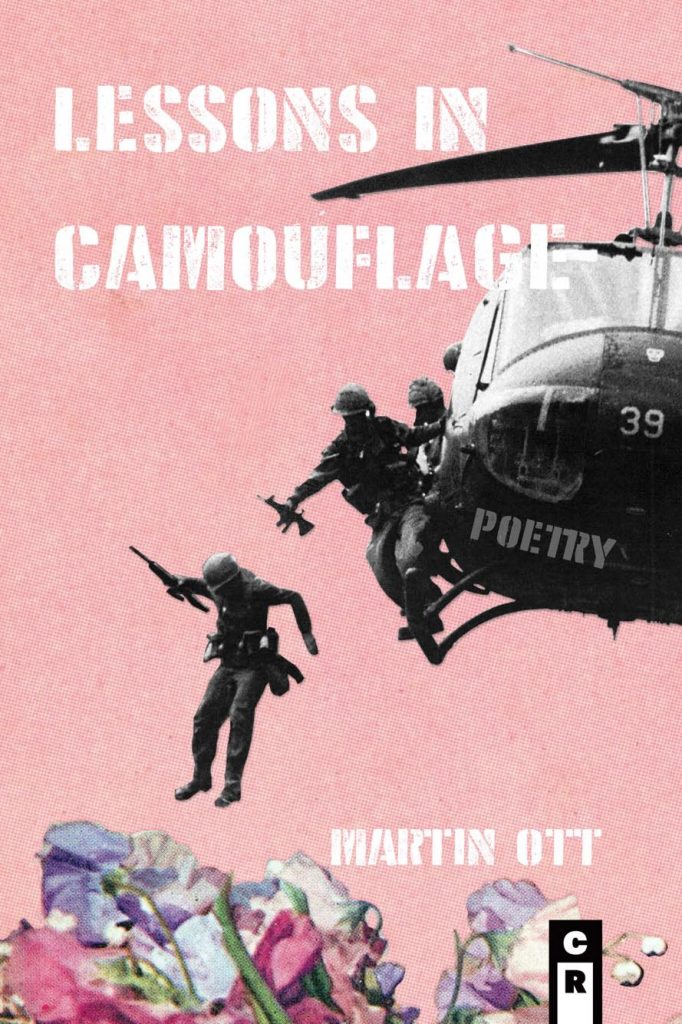
(C&R Press, 2018)
REVIEW BY TOM GRIFFEN
—
The title of Martin Ott’s third poetry collection, Lessons in Camouflage, conjures up the image of a military uniform. As if announcing, “Here’s what was learned while wearing one.” Such an allusion makes perfect sense, given Ott’s background as an Army interrogator—an asker of questions, gatherer of information, a seeker of truth, of admittance. The collection wastes no time setting a tone, expressing an intention. Line one of the opening poem, “The King of Camouflage” reads, “Yesterday’s sky is my molting skin.” The key word is “molting.” This shedding, this casting off of body parts serves as the spinal metaphor for the poet’s post-military personal journey.
Lessons in Camouflage is a melodic and, at times, manic dance of compacted and complex imagery. “The Gravel Diaries” sprays the landscape with visions.
I hid away in my room, lost in yellow,
the light stabbing villains and time-
washed pages. A child’s toy dagger
hisses in the scabbard. The LA River
gurgles in a tectonic bouillabaisse.
My heroes for a time hid in spines.
Damp shirts on the balcony ululate
on a swinging noose.
The reader’s imagination is scattered again with “Coming of Age Poem Using Fifty Words That Might Cause The NSA To Flag You As A Terrorist.”
His mother would sweep her mace into an indigo
purse and badger him, “Slow-poke the artichoke,”
for preferring Reno to the college snuffle, beef market
of lacrosse tossers, Jell-O shots, and credit card fraud.
The opening poem’s iambic meter is also a comfortable swaddling. It sets a slow pace and calls to mind traditional forms. “Look into ash. I’m there where you begin. / I am the shadow that forms in front and stays.” Repetition offers further amenity and clues of influence. Each of the 24 lines of “Mile Post” is repeated once. The piece opens with, “I made sure that no one ever passed me,” and ends, “I made sure that no one ever passed me. / Night will never catch day on the cratered runway. / Why am I still running from camouflage?” This echoing continues in “Why My Father Carries Three Guns,” wherein every other line concludes with a refrain, “…of guns.” A kind of declarative epimone attempting to answer the first line’s question, “Who will be my brother in the family of guns?” The poet looks for beauty, or at least acceptance, in an object of violence imbedded into his being. Hails it, “a symphony of guns.” “A neurobiology of guns.” “The shamanism of guns.” “The flooding of guns.” “The tragic trigonometry of guns.” But none offer solace. Thus continues the unlearning. A brittle flake falls from a peeling chrysalis.
Ott, often humorously, examines life’s plain sight artifacts, attempting to access convoluted, and disquieting issues. In “Marks” he hints at an ideal, a magic fix for particular faults. “Remember the guy on the infomercial / waving the wand over impossible stains, / erasing kids’ mistakes.” “I Lost The Robot In The Divorce” is a painful tease. Begins in kitsch, “With one eye, tin torso, dryer duct limbs, / my thrift store doppelgänger leans over / the scratched up dining room table,” then ends, unexpectedly, with a chilling memory that could either reference a failed marriage or a battle scene. “ Looking back, there was no way I could stop / things splitting, division of flesh, curse / of an immobile man in two places.”
“To The Guy Who Drew A Penis On The Elevator” begins with a sarcastic note of gratitude. “Thanks for giving us something to look / at when my kids visit, for the devotion / it took to bring a chair to etch it.” Deems the artistic cockandball effort, “Herculean.” Then, catches readers off guard with an ensuing question, free from mockery and rich in earnest curiosity: “Are you teaching us no container is / permanent, from womb to coffin, that the journey homeward is a messy / business?” Ott’s humor is a crutch, but not one carved from cowardice. Rather, it is a tool to bolster healing and personal revelation.
“Core” assures readers the original intention is attainable, even if such an achievement first requires acceptance. An honoring of brokenness, a shaky-handed readiness for life’s frailty.
The heart is a feathery fossil. It used
to beat. It used to soar. Today is swollen
with need. Do you hear it? When tanks
quake, when hands shake, when hills
tumble at the desk. Courage is holding
the pieces and knowing there’s more.
Lessons in Camouflage pares away a hardened shell. It is an attempt at rebirth. As Ott’s poems decorticate a protective and necessary guise, they give rise to a personal infrastructure ready to take on the challenges of civilian life. Relationships, fatherhood, the idea of masculinity—all is refurbished, then etched onto a disguise-free bedrock. The final poem, “33 Lessons In Camouflage,” solidifies this foundation while highlighting a transformative irony where the interrogator thus becomes the interrogated. And truths come spilling out.
Interrogation was a nesting doll
of camouflage, uniform as skin,
questions as fists to pummel any
chance to unhinge the man within.
—
Tom Griffen is a North Carolina writer and adventurer. He holds an MFA in from Pacific University. His work has appeared in The Rumpus, The Los Angeles Review, Tupelo Quarterly, Prairie Schooner, The Literary Review, O-Dark-Thirty, and others. In 2018, Tom walked across the USA. 3400 miles in 205 days. Follow his journeys on Instagram @tomswalkacrossamerica.
![[PANK]](https://pankmagazine.com/wp-content/themes/pank/assets/images/pank-logo-large.png)
